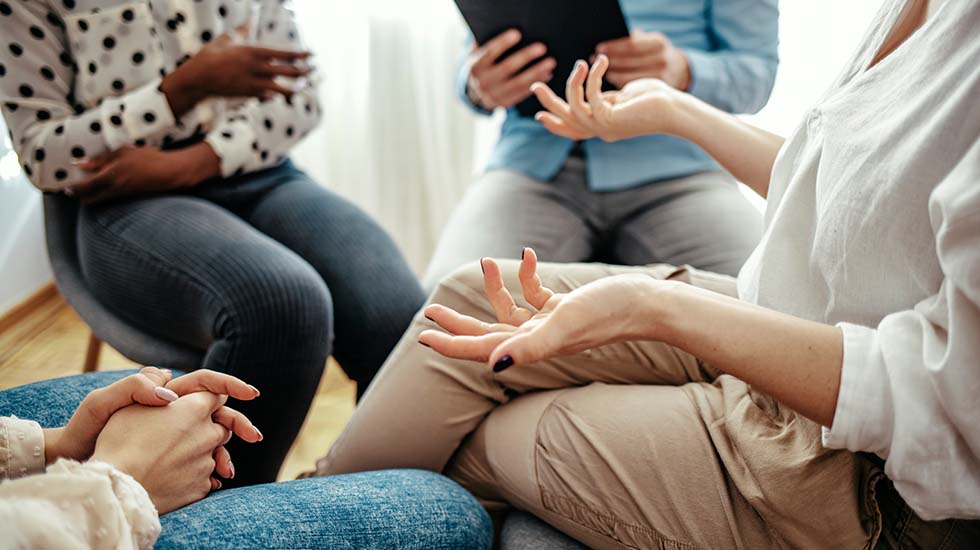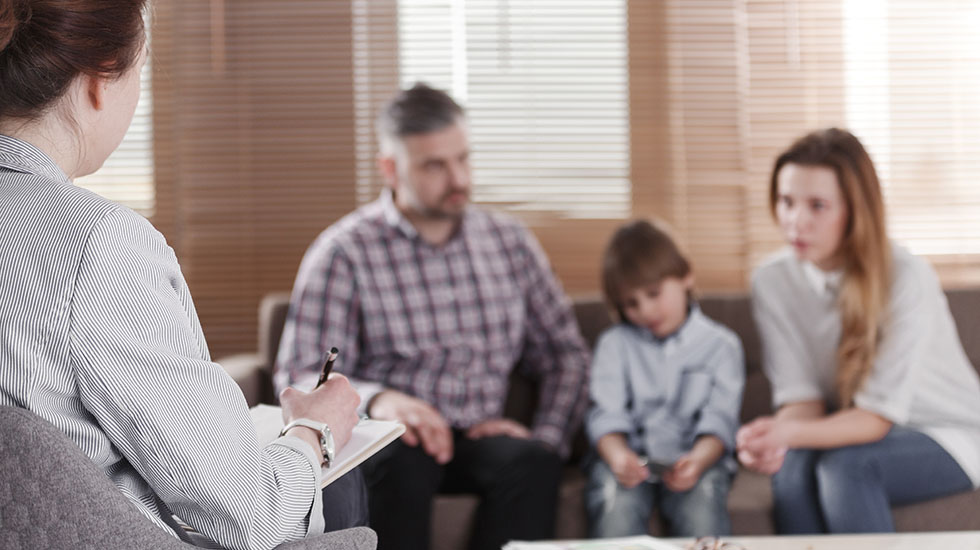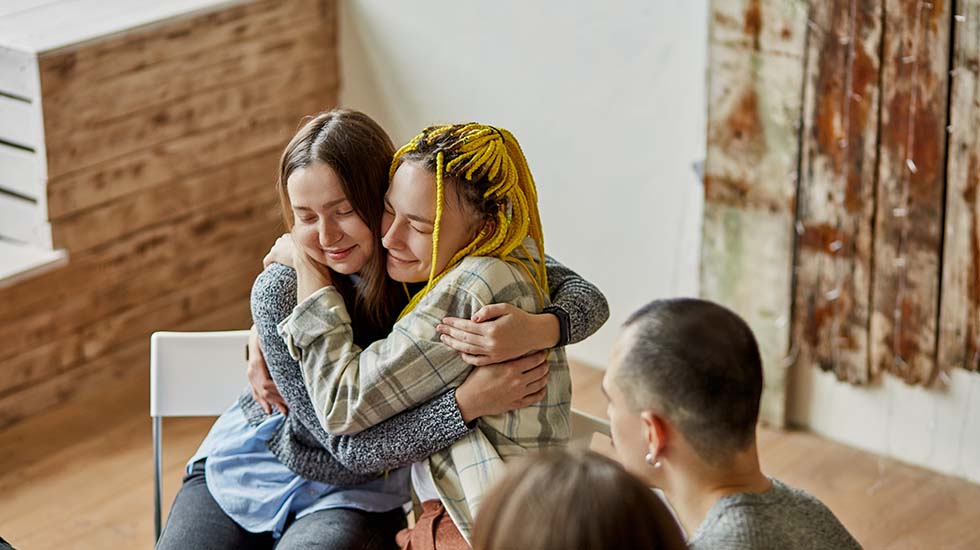Sobriety is easy to define but difficult to be. You won’t stay sober if you don’t understand why you’re an addict.
An inpatient rehab facility is not simply a room for addicts to stay clean for a few weeks. At The Hader Clinic, we aim to help you achieve long-term sobriety so you can build a safe, happy and fulfilling life. That’s why we take a holistic approach to the alcohol or drug use recovery process. We offer a range of therapies and treatments to improve your emotional, psychological, physical and social well-being.
We’re going to explain what our primary addiction treatment services are. Our therapy staff all have personal experience with addiction, and they know how to create safe, judgement-free spaces for you to heal and recover. Let’s get into it.
Our recovery support programs are designed to aid recovering addicts at any stage of their sobriety journey. Please do not hesitate to get in touch if you or a loved one are struggling with addiction. Make the call. Save a life.

Substance abuse treatments at drug and alcohol rehab
Cognitive behaviour therapy
Cognitive behaviour therapy (CBT) aims to help you understand your mental and emotional state and to unlearn unhelpful and harmful habits.
It’s not uncommon for addictions to cause spiralling or explosive mood swings. As an addict, you may often find you cannot bring yourself to believe recovery is possible. A negative sense of self can turn into a self-fulfilling prophecy, where any failure on your part proves your negative thoughts to be true. CBT helps you to break out of that spiral by identifying when you’re in it, why you’re in it, and how to climb out of it.
With cognitive behaviour therapy, you’ll learn essential self-help strategies to practice daily to improve your recovery resilience.
Individual counselling
Individual therapy is a one-on-one session between a recovering addict and a mental health professional. These sessions provide a safe space where addicts can explore their actions and emotions in total confidentiality.
Your counsellor will help you uncover the root causes of your addiction and the triggers that set it off. These triggers can include physical spaces, social environments or individual people, and emotional states like stress, fear and insecurity. As you understand your addiction, your counsellor will help you develop strategies to avoid and transcend your triggers.

Group therapy
Group sessions allow you to share your addiction story and learn from others in a safe, guided environment. We host small group sessions where participants may have different primary addictions. By sharing stories together, we create a judgement-free environment where we can discuss the thoughts and actions we might not be able to admit to people on the ‘outside’. These sessions foster a sense of camaraderie, and you’ll find them extremely important on days when you feel alone or lost on your recovery journey.
Psychosocial educational groups
Psychosocial counselling is a form of group counselling, but is focused on patients who share the same type of addiction. The goal of psychosocial sessions is to allow addicts to talk about the specifics of their addiction, that they feel only those who have gone through the same thing could understand.
Psychosocial therapy in rehab aims to help participants recognise common triggers and destructive behaviour and share strategies to overcome them.

Mentoring programs & peer support groups
Addict mentorship programs pair new addicts, like you, up with other addicts farther along on their recovery journey. As a recovering addict, your mentor will truly understand the difficulties you’ve faced and the challenges ahead of you.
Our peer support groups are small-group gatherings where you and those at the same stage of recovery can meet to discuss your progress. You’re not expected to improve every single day — these groups are a place for you to talk through your negative experiences with recovery.
The goal of mentoring and peer support programs is to offer you support, connection and accountability.
12-step rehab programs
12-step addiction recovery programs offer a tried and tested path to recovery which forces addicts to confront the consequences of their addiction to transcend them. At The Hader Clinic, we facilitate world-renowned 12-step programs like Alcoholics Anonymous (AA) and Narcotics Anonymous (NA).
AA and NA are explicitly religious and emphasise the role of the Christian God in recovery. However, these programs are not solely for Christians, nor do they demand conversion or even spirituality. The only requirement to participate is a desire for sobriety. Addicts and alcoholics around the world have found 12-step rehab therapy to be extremely effective for their recovery.

Dual diagnosis (mental health) treatment
Substance abuse is often tied to mental health disorders. Some people self-medicate with alcohol or narcotics to deal with their mental health issues; others develop mental health disorders after years of continuous substance abuse.
Dual diagnosis therapy creates treatment plans that address both your primary addiction as well as your mental health. A dual diagnosis treatment plan can help you to:
- Identify and understand the mental health disorders you have
- Access the therapy and medication you need to stabilise and improve your mental health
- Improve your executive functioning, memory and emotional stability
Family therapy
Family therapy allows recovering addicts and their families to seek counselling together. Family sessions provide a space for families to discuss how addiction has impacted each member. Family trauma can flow both ways; many addicts break family ties during their lowest moments, but some families knowingly or unknowingly encourage and enable their loved one’s addiction.
You and your family are encouraged to speak openly and freely so that your counsellor can help you each to find closure and even reconciliation.
Family counselling in rehab can help affected families to address:
- Marital problems
- Parent/child problems
- Domestic violence
- Infidelity
- Financial problems
- Communication breakdowns
- Trust issues
- Conflict resolution

Holistic therapies
Recovery isn’t just about leaving behind your addiction — it’s also about growing as a person. We provide a range of therapies and activities to foster your physical, creative and emotional abilities. These include a variety of sports classes and outdoor recreation activities, physical rehabilitation and yoga, art therapy, and even massage.
Transitional housing
Once you have completed your residential treatment, we can offer you a 12-week stay in our transitional housing facility until you find your own accommodation. We will provide your meals, and all of your rent and utilities will be covered.
In our transitional program, you can access many of the same therapies you received at our inpatient rehab.

Aftercare and relapse prevention
Recovery is an ongoing process, and we can make our services available to you as long as you need them. To help you avoid relapsing, we offer:
- 24/7 Crisis Hotline — 1800 957 462
- Weekly individual counselling session
- Fortnightly family support groups
- Urine drug screening








